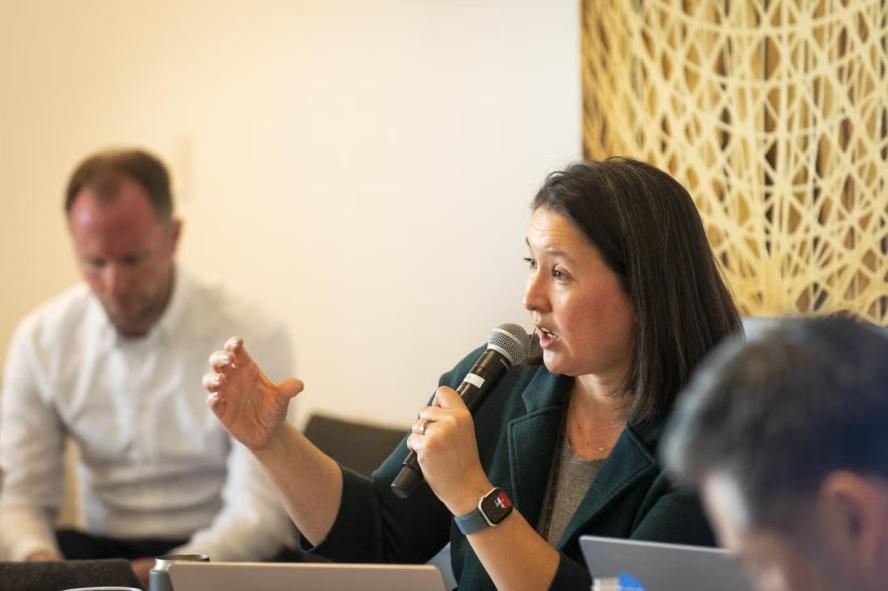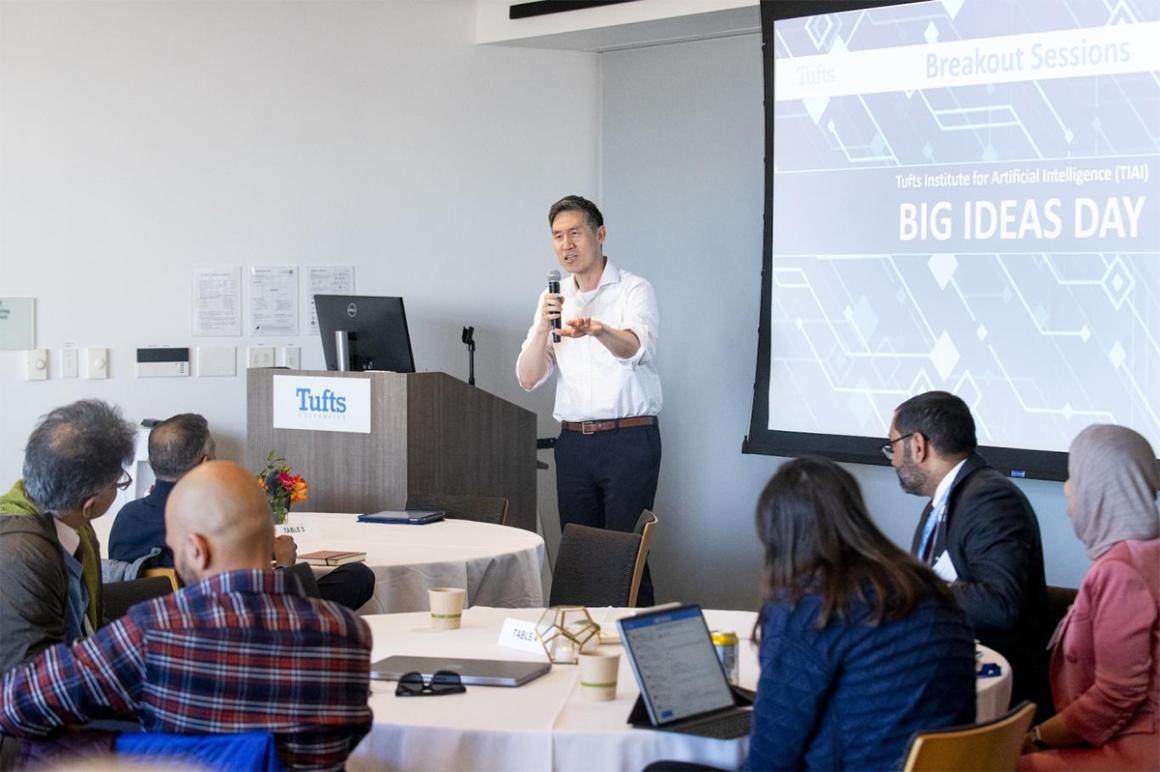-
About
- Departments & Offices
-
Academics
- Public Health
- Biomedical Sciences
- Physician Assistant
- Special Master’s (MBS)
-
Admissions & Financial Aid
- Tuition & Fees
-
Student Experience
-
- Student Resources by Program
- Academic & Student Support
- Wellness & Wellbeing
- Student Life
- Events & Traditions
-
-
Research
- Research Labs & Centers
- Tufts University-Tufts Medicine Research Enterprise
-
Local & Global Engagement
- Pathway & Enrichment Programs
- Global Health Programs
- Community Engagement
Exploring AI and Health Sciences Connections at TIAI-Big Ideas Day
For Tufts Institute for Artificial Intelligence’s launch, presenters set the stage for collaboration.

Tufts recently took a collective first step toward applying the power of AI to advance health science-related research. Convening at the School of Dental Medicine, presenters shared research opportunities and challenges at TIAI-Big Ideas Day, the official launch of the Tufts Institute for Artificial Intelligence on February 28.
Sharing the institute’s commitment to harnessing AI for social good and ethical innovation, five faculty presenters described their aspirations for AI to bring critical new insights, as well as global scale, to health-related progress, including improving effective drug regimens for tuberculosis, humanitarian response to those at extreme risk of malnutrition, and the development of standardized algorithms that contribute to reliable best practices around the world.
The institute’s call to action around social good reinforces a mission “consistent with the culture and values of Tufts as an institution that takes ethics and civic engagement very seriously,” said Kyongbum Lee, School of Engineering dean and Karol Family Professor, in opening remarks. “We expect that theme to cut across all the work we do because that's who we are. We want to be responsible to society.”
In identifying where Tufts can have the most positive impact, the collective focus on the intersection of AI and the health sciences “made a lot of sense,” Lee said, noting the Tufts reputation for excellence at Tufts’ schools of medicine, dental medicine, nutrition, and veterinary medicine.
The presentations set the stage for afternoon topical discussions focused on developing innovative proposals to be considered for early-stage funding.
“I fully expect we have many more ideas than we can possibly fund with the initial resources we have,” said Lee. “But that's a great problem to have. Our first task as researchers is to generate the ideas [that will have impact]. This is one of the best ways we can bring purpose to [the work we do at Tufts] but also to a broader community of researchers and scientists.”
For the “Greater Good”
Big Ideas Day is the first event of the Tufts Artificial Intelligence Institute, established earlier this year to align AI initiatives, research efforts, and educational programs across various centers and schools, and to create opportunities for interdisciplinary research and study.
Organized around research “idea centers” rather than traditional disciplines, the institute encompasses the Center for Data Foundations in AI (formerly the Data Intensive Studies Center) and the Center for Human-AI Interaction. A Center for AI in Health is also planned.
Administered by the School of Engineering on behalf of the university, TIAI will focus on catalyzing collaborative AI research across Tufts’ schools that will lead to discoveries and innovations in social impact areas such as health, education, and sustainability. One of its first initiatives is a seed funding program for new cross-school research projects aimed at advancing healthcare through AI. In addition to directly supporting research projects, the institute will also serve as a resource for other faculty-led initiatives that advance Tufts’ mission for social good through AI. A search will soon be under way for an institute director.
In a Tufts Now interview prior to Big Idea Day, Lee said the institute structure is a strategic shift that leverages areas of strength that reside in different schools across the university.
“This is a structure that allows us to bring together the AI expertise in some of our engineering, math, and science departments with the research and clinical expertise in the health sciences schools,” he said. “By bringing together expert biomedical and AI researchers with clinicians, we expand the possibility of translating research into actionable outcomes.”
That those outcomes will serve the greater good, he said, reflects Tufts’ ethics, values and mission of civic engagement. “It’s important that academic institutions keep the role in mind as they forge ahead with the research around AI,” he said. “Universities have a role to play in keeping AI on the path that is trustworthy and truly beneficial for people.”
The Potential for Collaborative Innovation
The first Big Ideas Day served as a window onto AI-related research at Tufts, as well as an invitation to share aspirations for potential AI applications in health care as well as problem-solving strategies that tap into the power of AI to accelerate and scale innovations. The Big Ideas Day presenters were:
Andrew Williams, director of the Center for Advanced Healthcare Research Informatics at Tufts Clinical and Translational Science Institute, identified a “huge potential” for improving standards for healthcare data, given the “very significant challenges” that come with working with tremendous volume of data. According to Williams, the challenge ahead: “[The data] is not typically structured and organized in the way that … AI algorithms typically need.”
Shuchin Aeron, associate professor of electrical and computer engineering brought forward how AI applications are driving innovations in a wide array of settings, from geophysical signal processing to education. His work has led to advancements in both theoretical foundations and practical applications, including patented innovations in acoustic signal processing.
Bree Aldridge, professor of molecular biology and microbiology at the School of Medicine, framed her talk around her innovative work in tuberculosis research and treatment strategies.
She sees AI as instrumental in accelerating the development of promising drug combinations for treating tuberculosis (TB). TB is difficult to treat, she said, due to multiple sites of infection that respond differently to antibiotics. One promising strategy for developing new, effective treatments is to use combinations of existing drugs. However, testing all possible drug combinations is infeasible, she said, given the sheer scale of experiments this would require. Instead, her team has generated a “small AI” approach to efficiently explore tens of thousands of responses to different drug combinations by Mycobacterium tuberculosis bacteria under different growth conditions.
“There’s a big role for small AI where the question is: how do we use AI to accelerate progress in fields where we're really limited in resources, such as drug development and infectious diseases?” she said. “And associated with that is the question of how do we train the next generation of scientists to understand how to use these tools? I hope that we know enough to articulate our questions and understand the caveats and to talk to experts who are on the leading edge of how to use these algorithms.”
Elena Naumova, professor and chair of the Nutrition Data Science Division at the Friedman School of Nutrition Science and Policy, leads several global collaborations in infectious disease surveillance, climate-sensitive health research, and the application of novel data sources—from satellite imagery to healthcare records. As director of the Tufts Initiative for Forecasting and Modeling of Infectious Diseases, she has been instrumental in shaping policies on data sharing, quality, and security.
Naumova discussed AI research opportunities in public health, including identifying at-risk populations and improving applications in humanitarian assistance. The difficulty of getting data from hard-to-reach populations around the question of food security, for example, forces researchers to make generalizations from small-cohort studies, which raises questions about “ontology, vocabulary, and terminology,” according to Naumova. To prevent valuable information from being lost, she said, data must be clear and well verified; it also “requires training people who have vision ... to keep this data agile, timely, and supportive.”
Michael Hughes, assistant professor of computer science, specializes in statistical machine learning (ML), with a focus on developing predictive and explanatory models that help uncover useful patterns in complex datasets. A key area of his work involves applying AI to clinical informatics, including using ML to improve cardiovascular disease diagnosis from ultrasound images and predicting patient risk based on data from electronic health records.
Hughes’ remarks also doubled as an endorsement of Big Ideas Day as a concept well-suited to Tufts’ culture. Building relationships across fields has played a significant role in his development of next-generation fast-training algorithms with healthcare application. With Ben Wessler, a cardiologist at Tufts Medical Center, he has studied effective treatments for aortic stenosis, a degenerative heart valve disease. With Tom Stopka, professor of Public Health and Community Medicine, he has explored preventing overdose deaths, and with David Kent, director of the Tufts Predictive Analytics and Comparative Effectiveness Center, he worked on a project to predict the risk of stroke and of dementia.
“One of the reasons I love being at Tufts is that we can really do team science,” Hughes said. “I'm here to advocate that we do more and more team science where we can come together and figure out how we're going to solve real problems.”
Department:
Molecular Biology and Microbiology
